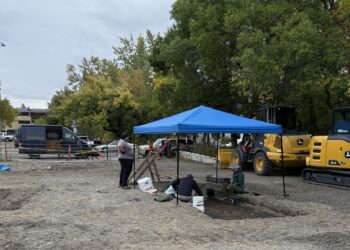 By Scott Mechura EBS Food Columnist
By Scott Mechura EBS Food Columnist
Globally we have seen the ebb and flow of commercial fishing and its ecological effects for decades. Fish like juvenile swordfish, blue fin tuna, or certain species of wild salmon for example, have been moved on and off endangered lists, based on how well we are managing their populations worldwide.
For me, once I decide on a fish I want to sell, I consult the Monterey Bay Aquarium Seafood Watch. Not only do I want to know if the fish is on an endangered species list, but I also want to know where and how the fish was caught.
I strive to find better fishing practices, such as hand lines, and try to avoid less ideal methods, like the use of pelagic longlines. I recently learned of a type of fishing that, true to its name, is far scarier than anything I had imagined. It’s called ghost fishing.
Ghost fishing is what happens when fish and other marine life get caught in abandoned, lost or discarded commercial fishing gear such as crab and lobster cages, or get snagged on hooks from miles of wayward fishing lines floating like Halloween spider webs, waiting to entrap their victims. Damaged nets can also snare mammals that need to frequently surface for air.
Some of this equipment is washed overboard, or torn off in storms, while others are simply discarded at sea. In the Netherlands for example, fishermen are charged a substantial fine upon returning to the mainland with missing pieces of fishing equipment. Oddly enough, those fines are put in place to keep the oceans clean of damaged fishing equipment.
In one fishery in the northeast Atlantic alone, it is estimated that 25,000 nets are lost or discarded annually. Attached end-to-end, these nets could span the distance from New York to Chicago.
The United Nations Environment Program and the U.N. Food and Agriculture Organization estimate that 640,000 tons of fishing gear are left in our oceans every year. That’s the equivalent weight of almost 500,000 automobiles.
Right here in the U.S., recent clean-up efforts in Washington state yielded 870 ghost nets containing 32,000 marine animals.
There was a time when fishing nets were made from cotton or hemp and would biodegrade in a relatively reasonable amount of time. But in recent decades, fishing nets have been made from synthetic materials to prolong their life, while tragically shortening or ending the lives of so many hapless fish and wildlife. The strength of a net made today is believed to retain enough integrity to entrap even the largest marine animal 100 years from now.
There lies the tragedy of the commons—a global problem in which the responsibility falls on everyone, yet the incentive to rectify it lies with no one.
So what do we do?
There is hope. In the Arabian Sea, the United Arab Emirates ruled in 2002 that at least one of the walls of all traps must be biodegradable. And a company called Net-Works purchases discarded nylon fishing net and repurposes it into carpet tiles.
Our first response is often to say we are not buying seafood anymore. But the reality is that commercial fishing equipment is expensive, so the more seafood we buy, the more money the fishermen make. And the more they make, the less likely they might be to cast away nets, lines and other fishing gear, opting instead to return to shore and repair damaged equipment, which can sometimes be more expensive than the fine for lost equipment all together.
Scott Mechura has spent a life in the hospitality industry. He is a former certified beer judge and currently the Executive Chef at Buck’s T-4 Lodge in Big Sky.













